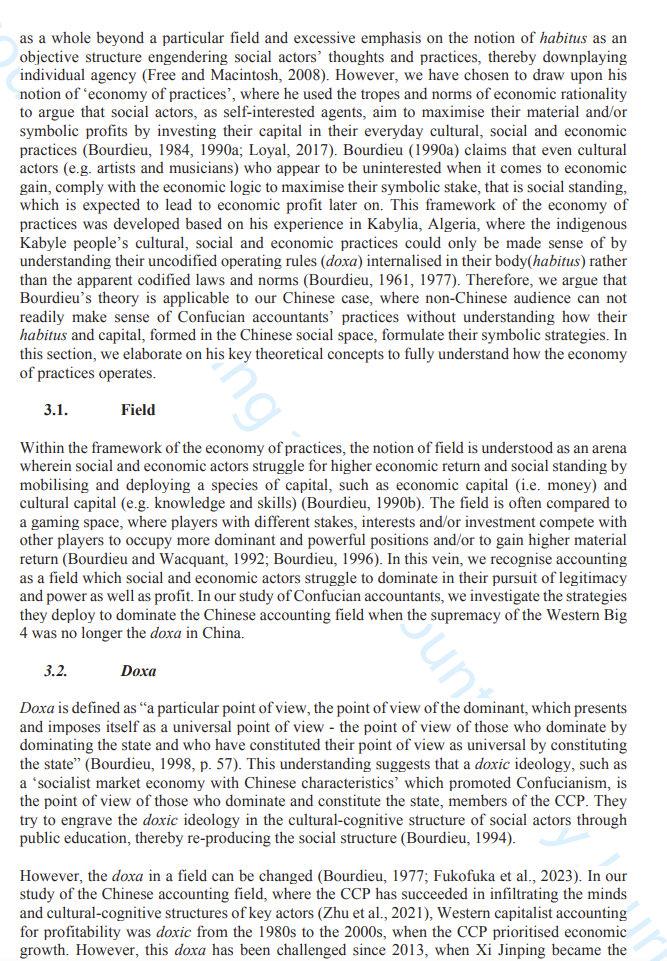近日,北京师范大学湾区国际商学院助理教授王禹衡博士以第一作者身份在会计学领域重要期刊《Accounting, Auditing & Accountability Journal》上发表了题为《Make China Great Again: The Strategies of Confucian Accountants》的研究论文,该期刊为全球排名前三的质性交叉学科会计期刊。
论文深入探讨了会计职业在全球化进程中如何因最近爆发的西方与世界其他地区之间的第二次冷战而发生变化。作者探索了中国自称为“儒家会计师”的生存策略。论文采用后实证主义定性研究方法,主要包括反思性照片访谈,其中向国际化的四大会计师和本土儒家会计师要求他们拍摄并解释代表他们专业和生活有关的照片。借鉴了布迪厄的“实践经济”和“分化视野策略”概念,以理解儒家会计师是谁,以及他们在追求更高收入和改善在中国社会空间中的社会地位时战略性地做了什么。
研究发现,本土化的儒家会计师与周边社会行为者(如客户和政府官员)分享文化认知特征,他们嵌入儒家思想和国家的文化自信政策。这些会计师试图通过战略性地展示与四大会计师的不同来增强他们的社会地位和生存方式。为此,他们穿着儒家服装,在办公室里摆放儒家道具,日常谈话中使用儒家语言,使用儒家名片,塑造独特社会惯习和竞争手段,与政府官员和客户建立和维护关系,以达到其获取更高权力和声誉的目的。
论文英文摘要:
Purpose: This paper aims to offer insight into how strategies within the accounting profession, which has been becoming more global, might be changed by the recent outbreak of the Second Cold War between the West and the Rest of the World. Design/methodology/approach: We explore the strategies of those who called themselves ‘Confucian accountants’ in China, a country which has recently discouraged its state-owned enterprises from using the services of the Big 4. We do this by employing qualitative research methods, including reflexive photo interviews, in which Big-4 accountants, recognised as the most Westernised accounting actors in China, and Confucian accountants are asked to take and explain photographs representing their professional lives. Bourdieu’s notions of ‘economy of practices’ and ‘vision-of-division strategy’ are drawn upon to understand who the Confucian accountants are and what they do strategically in their pursuit of a higher revenue stream and improved social standing in the Chinese social space.
Findings: The homegrown Confucian accountants share cultural-cognitive characteristics with neighbouring social actors, such as their clients and government officials, who have been inculcated with Confucianism and the state’s cultural confidence policy in pursuit of a ‘socialist market economy with Chinese characteristics’. Those accountants try to enhance their social standing and revenue stream by strategically demonstrating their difference from Big-4 accountants. For this purpose, they wear Confucian clothes, have Confucian props in their office, employ Confucian phrases in their everyday conversations, use Confucian business cards and construct and maintain guanxi with government officials and clients.
Originality: This paper is the first attempt to explore Confucian accountants’ strategies for increasing their revenue and social standing at the start of the Second Cold War.
Key words: Accounting profession, Confucian accountants, Bourdieu, Confucianism, China

